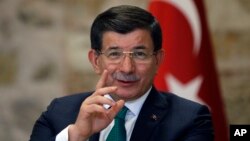Turkey is claiming vindication for sending troops and tanks into Iraq, following an attack on a Turkish base training Iraqis who are fighting Islamic State. The attack came days after intense pressure from Baghdad forced Ankara to pull out some reinforcements it sent to the camp following threats from IS militants.
Turkey appears to be hardening its stance towards Baghdad over its controversial deployment of soldiers and tanks to protect forces training Iraqis in northern Iraq.
Prime Minister Ahmet Davutoglu said an attack Wednesday on its Iraq base by IS militants justified the recent military deployment, but he also suggested there was a strategic reason behind the move.
"We are facing such developments in Iraq and Syria so that security of our borders starts from beyond the borders," he said.
Baghdad is demanding the immediate withdrawal of all of the Turkish forces deployed this month, warning it would take the issue to the United Nations Security Council. While Ankara has removed some of its forces, it has ruled out a full withdrawal.
Turkey deployed troops to help train Kurdish peshmerga fighters under the control of the regional Kurdish government, with which Ankara has good relations. Troops had recently moved toward Islamic State-controlled Mosul.
Washington has weighed into the dispute. A White House statement has called for Turkey to withdraw from Iraq unauthorized deployed forces.
Political scientist Cengiz Aktar of Istanbul’s Suleyman Sah University said the statement indicated growing concern about Ankara among its allies.
"Turkey is looking more and more nowadays as a very unpredictable and sometimes risky ally to the West, to its classical strategic partners. So yet another front for Ankara, another crisis for Ankara to deal with," said Aktar.
The Iraqi controversy coincides with Ankara’s deepening crisis with Moscow stemming from last month’s downing of a Russian jet.
President Vladimir Putin warned Thursday he foresees no improvement of relations with the current Turkish leadership of President Recep Tayyip Erdogan.
Global Source Partners consultant Atilla Yesilada said Ankara was now faced by a dangerous coalition.
"It is not about a jet or a couple of soldiers in a remote training camp, but the birth of an anti-Turkish axis in the region. Baghdad, Assad, Iran and Russia, demand no less than a complete neutrality from Turkey in the regional affairs, which Mr. Erdogan is simply not ready to accept," said Yesilada.
But Ankara appears to be doubling down, building up its own alliance beyond its traditional partnership in NATO. On Thursday, Ankara announced a military agreement with Qatar to deploy thousands of Turkish forces in the Gulf State.




